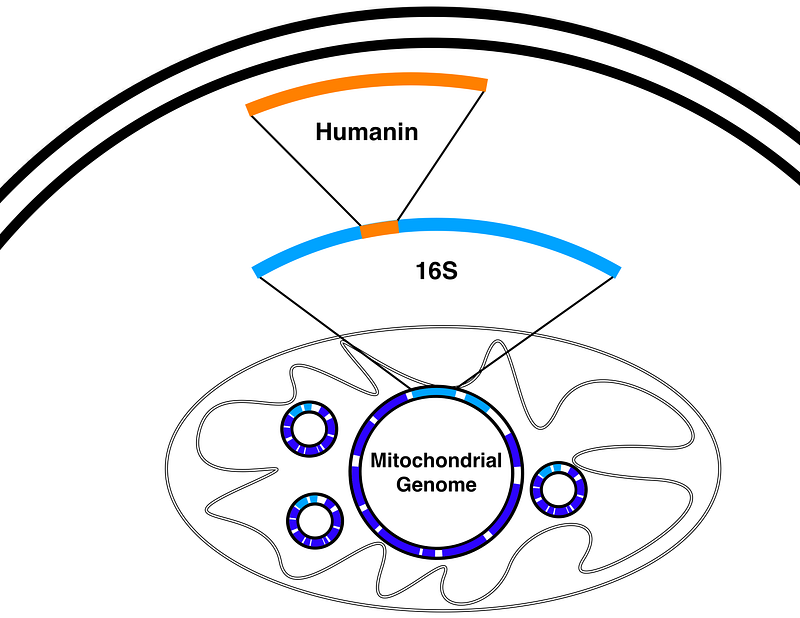 |
| Photo by Liane Metzler on Unsplash |
What is Humanin (HN)?
A short mitochondrial peptide was discovered over a decade ago. Since the discovery, its association with biological functions like apoptosis, cell survival, substrate metabolism, inflammatory response, and response to other stressors have been established. HN and its potential analogs have shown promises for different age-related disorders like Alzheimer’s, diabetes, and stroke.
Humanin is encoded by a short sequence present in the 16s Ribosomal RNA coding region of the mitochondrial DNA (mtDNA).
Earlier researches have demonstrated higher levels of the peptide to enhance insulin activity and prolong the survival of pancreatic beta cells leading to a beneficial effect on both types of diabetes. Promises are equally pronounced against Alzheimer’s and Huntington disease models
A significant phenomenon observed in rodents (naked mole-ray) and worms (C. elegans) revealed a modification in genes of the organisms to produce consistent Humanin levels increased their overall lifespan. However, on the flip side, these animals had fewer offsprings. In those with higher offsprings, the humanin level was much reduced indicating an exchange of longevity with reproductive ability.
Dr. Kelvin Yen relates this phenomenon with the goal of life. The end goal of all living systems is to reproduce and the longevity is somehow traded with this goal. Hindrance to reproduction with a few offsprings results in a side effect that allows them to keep hanging around nature for a longer time, which happens to be longevity.
Another interesting part of the research is the concentration level of humanin in the offsprings of Centennials. A 100-year lifespan is above an average human lifespan, and their offsprings revealed a much steady humanin level. The interpretation is that the children of centennials have statistically higher chances to reach this age.
The study also presumptively indicates higher and steady humanin levels in the body of animals contribute to greater resistance to disease. A controlled comparison between Alzheimer’s patients and the newborns reported with higher levels of the peptide accompanied by a higher number of mtDNA (mitochondrial DNA) in newborns in contrast to the patients with significantly lower levels of humanity.
- The first research to show humanin sufficiency is capable of extending lifespan.
- The insulin/Insulin-like growth factor-1 (IGF-1) is the pathway for humulin interaction to increase the lifespan.
- Mitochondrial signaling and MDPs (Mitochondrial Derived Peptides) have a significant role in aging and age-related diseases.
Presumptively, the potential of the mitochondrial peptide has exhibited beneficial effects for different age-related diseases. The declination of HN at old age is a direct correspondence of its role in aging and longevity. From a therapeutic point of view, there is quite a possibility for it to be administered as an old age vaccine to better protect against a broad range of age-related disorders.
Details of the research
Research Title: The mitochondrial derived peptide humanin is a regulator of lifespan and healthspan
Authors: Kelvin Yen1 , Hemal H. Mehta1 , Su-Jeong Kim1 , YanHe Lue2 , James Hoang2 , Noel Guerrero1 , Jenna Port1 , Qiuli Bi1 , Gerardo Navarrete1 , Sebastian Brandhorst1 , Kaitlyn Noel Lewis3 , Junxiang Wan1 , Ronald Swerdloff2 , Julie A. Mattison4 , Rochelle Buffenstein3,5 , Carrie V. Breton6 , Christina Wang2 , Valter Longo1 , Gil Atzmon7,8 , Douglas Wallace9 , Nir Barzilai7 , Pinchas Cohen1
University: University of Southern California, Leonard Davis School of Gerontology
Published Date: June 23, 2020
Journal Name: Aging, 2020
DOI: https://doi.org/10.18632/aging.103534
Journal Impact Factor: 5.515 (2018)
Keywords:


The information you've provided is useful because it provides a wealth of knowledge that will be highly beneficial to me. Thank you for sharing about Fast turnaround time custom peptide synthesis. Keep up the good work.
ReplyDeletePost a Comment